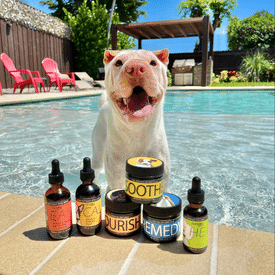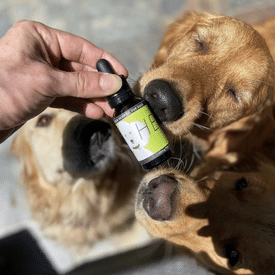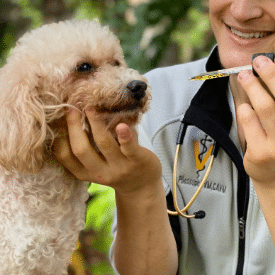The Truth About Aloe Vera for Dogs

If you’ve ever had a sunburn, you’ve probably turned to aloe vera gel for that instant soothing relief. However, just the phrase ‘aloe vera for dogs’ raises a red flag for many dog lovers and pet parents. This is because of some common misconceptions that the aloe vera plant is completely toxic, which is not the case.
There are several myths about this beneficial succulent. There are parts of the aloe plant that have a terrible reputation but have a number of benefits, and then there are parts of the aloe plant that can indeed cause adverse reactions like diarrhea in your pet. It’s all about recognizing which part of the plant is therapeutic, much as with many other effective natural remedies.
Table of Contents
Is Aloe Vera Safe for Dogs?
If you take a bite from a raw aloe plant, it can be harmful to both dogs and people (not to mention, the barbed leaves will leave you with more than a few cuts in your mouth). In order to fully understand the uses of aloe vera for dogs, and where it can become therapeutic, it’s important to know that aloe leaves have three parts. Each part serves its own purpose, and there is one part, in particular, that is of interest to us (for humans, dogs, cats, and other animals) for medicinal purposes.
The rind of the plant is usually barbed and has no nutritional value — you can think of it as the skin of the plant. Directly under the rind is a yellow layer called aloe latex, which contains saponins that can be potentially harmful. Aloe latex contains a chemical called aloin. Aloe latex can cause skin irritation in anyone with a latex allergy, and aloin can be used as a laxative. In fact, people use aloin on themselves and their pets in small doses for diet cleanses.
Is Aloe Vera Good for Dogs?
Aloe Vera for dogs with hot spots and skin allergies can be incredibly helpful. Aloe can help heal burns, wounds, infections, skin sensitivities, and can act as an antifungal. Safely using aloe vera for dogs depends on the part of the plant that the aloe comes from and the additives inside of it.
The important part of the aloe plant is directly in the middle of the plant in the inner leaf juice. The inner leaf juice is perfectly healthy and safe for external use and even for consumption. The inner leaf juice is anti-inflammatory, anti-fungal, and can heal burns, eczema, hotspots, lesions, rashes, and more.
Aloe Vera has also been shown to be helpful with ulcers, although additional research is necessary to determine what method of administration is most effective. According to current research, “anti-ulcer activities of A. vera have been attributed to several possible mechanisms including its anti-inflammatory properties, healing effects, mucus stimulatory effects and regulation of gastric secretions.”
How to Use Aloe Vera for Dogs
Not all aloe products are created equally. When preparing aloe vera for dogs, the aloe should be extracted with care and should not include any of the yellow parts of the plant. If you are cutting your own aloe plant, take care to ensure that you scoop out only the inner leaf juice, and remove the rind and yellow parts before putting it on your pet.
In its pure form, aloe is clear and can be slightly watery. Food-grade aloe does not contain aloin or aloe latex and is perfectly safe to rub on your pet’s skin. If they lick food-grade aloe, your pet should not have any reaction.
Aloe that you purchase at the store to relieve sunburns, however, may not be safe for your pet to lick. You may notice that aloe from the store is a bright green color — this is because there are other chemicals, additives, and dyes to prolong the shelf-life and preserve the enzymes in the store-bought aloe vera. Unless your product is all-natural and marked as “pet-safe”, it is a good rule of thumb to stop your dog from licking it.
Final Thoughts
There are many natural remedies that can prove extremely beneficial, but there are also some you must use caution with. Be certain to do your research prior to adding a product to your dog’s regimen. To learn about more healthy, natural solutions for your pet, take a tour of our blogs or check out our CBD salves for dogs, cats and horses.















